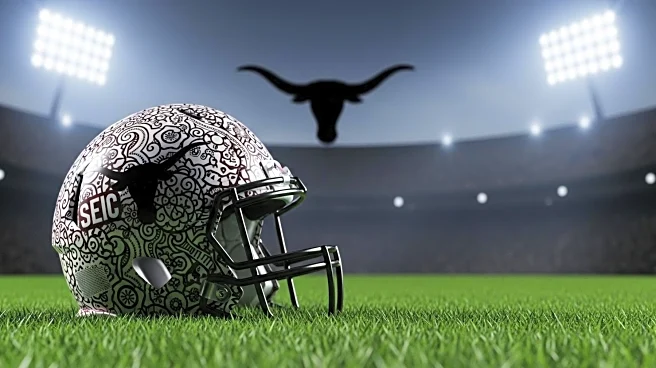What is the story about?
What's Happening?
The Southeastern Conference (SEC) in college football is experiencing a shift in dynamics, with no clear dominant team emerging. Historically, the SEC has been known for its powerful teams, but recent changes such as Name, Image, and Likeness (NIL) deals and transfer rules have altered the landscape. Texas, a key player in the conference, has not lived up to expectations despite significant NIL investments. The SEC, while still competitive, is now playing catch-up to teams like Ohio State and Miami, which have excelled in the NIL space. The conference's previous dominance, characterized by stockpiling talent and developing NFL-ready players, is being challenged by these new dynamics.
Why It's Important?
The changes in the SEC reflect broader shifts in college football, where financial incentives and player mobility are reshaping team strategies and competitive balance. The lack of a dominant SEC team could impact the conference's ability to secure playoff spots and maintain its historical superiority. This situation highlights the evolving nature of college sports, where traditional powerhouses must adapt to new rules and financial landscapes. Teams like Texas, despite their resources, are struggling to convert financial investments into on-field success, which could influence recruiting and fan engagement.
What's Next?
As the season progresses, SEC teams will need to adjust their strategies to remain competitive. This may involve reevaluating recruiting practices and NIL strategies to better align with the new realities of college football. Stakeholders, including coaches and athletic directors, will likely focus on optimizing player development and retention to regain competitive advantages. The performance of teams like Texas will be closely watched, as their ability to leverage NIL deals effectively could set a precedent for other programs. Additionally, the SEC's efforts to secure playoff positions will be crucial in maintaining its reputation as a leading conference.
Beyond the Headlines
The shift in the SEC could have long-term implications for college football, including changes in how talent is distributed across conferences. The rise of NIL and transfer rules may lead to increased parity, with more teams able to compete at high levels. This could democratize college football, reducing the dominance of traditional powerhouses and creating opportunities for smaller programs. The ethical considerations of pay-for-play and the impact on student-athletes' academic experiences may also become more prominent as these changes unfold.
















